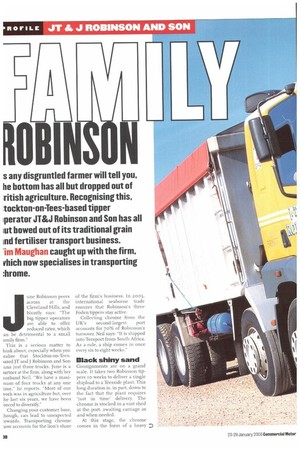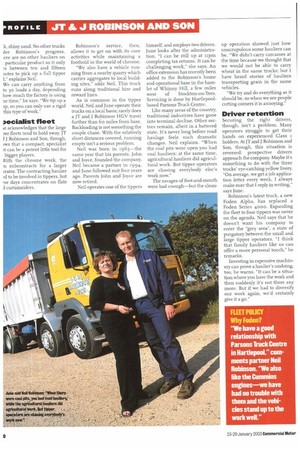IN
Page 38

Page 40

If you've noticed an error in this article please click here to report it so we can fix it.
s any disgruntled farmer will tell you, he bottom has all but dropped out of ritish agriculture. Recognising this, tockton-on-Tees-based tipper iperator JT&J Robinson and Son has all Int bowed out of its traditional grain Ind fertiliser transport business.
Maughan caught up with the firm, which now specialises in transporting :hrome.
June Robinson peers
across at the Cleveland Hills, and bluntly says: "The big tipper operators are able to offer reduced rates, which an be detrimental to a small amily firm."
This is a serious matter to hink about, especially when you cause that Stockton-on-Tees)ased JT and J Robinson and Son tins just three trucks. June is a )artner at the firm, along with her iusband Neil. "We have a maxinum of four trucks at any one ime." he reports. "Most of our vork was in agriculture but, over he last six years, we have been brced to diversify."
Changing your customer base, :hough, can lead to unexpected rewards. Transporting chrome :low accounts for the lion's share of the firm's business. In 2003, international seaborne trade ensures that Robinson's three Foden tippers stay active.
Collecting chrome from the UK's second-largest port accounts for 70% of Robinson's turnover. Neil says: "It is shipped into Teesport from South Africa. As a rule, a ship comes in once every six to eight weeks."
Black shiny sand
Consignments are on a grand scale. It takes two Robinson tippers to weeks to deliver a single shipload to a Teesside plant. This long duration is, in part, down to the fact that the plant requires 'just in time' delivery. The chrome is stocked in a vast shed at the port, awaiting carriage as and when needed.
At this stage, the chrome comes in the form of a heavy
:k, shiny sand. No other trucks der Robinson's progress. ere are no other hauliers on particular product so it only !..s between ten and fifteen lutes to pick up a full tipper 1," explains Neil.
We can carry anything from to 30 loads a day, depending how much the factory is using he time," he says. "We tip up a so you can only use a rigid this type of work."
"cola s t fleet Le acknowledges that the large 3er fleets tend to hold sway. JT i J Robinson and Son, though, mrs that a compact, specialist A can be a potent little tool for bigger players.
With the chrome work, the n subcontracts for a larger ±rator. The contracting haulier xl to be involved in tippers, but !se days concentrates on flats curtainsiders. Robinson's service, then, allows it to get on with its core activities while maintaining a foothold in the world of chrome.
"We also have a vehicle running from a nearby quarry which carries aggregates to local building sites," adds Neil. This truck runs along traditional hire and reward lines.
As is common in the tipper world, Neil and June operate their trucks on a local basis; rarely does a JT and j Robinson EIGV travel further than Go miles from base. Bacldoading is not something the couple chase. With the relatively short distances covered, running empty isn't a serious problem.
Neil was born in 1963—the same year that his parents, John and Joyce, founded the company. Neil became a partner in 1994, and June followed suit four years ago. Parents John and Joyce are now retired.
Neil operates one of the tippers himself, and employs two drivers. June looks after the administration. "I can be still up at 'rpm completing tax returns. It can be challenging work," she says. An office extension has recently been added to the Robinson's home and operational base in the hamlet of Whinny Hill, a few miles west of Stockton-on-Tees. Servicing is done by Hartlepoolbased Parsons Truck Centre.
Like many areas of the country, traditional industries have gone into terminal decline. Other sectors remain, albeit in a battered state. It's never long before road haulage feels such dramatic changes. Neil explains. "When the coal pits were open you had coal hauliers; at the same time, agricultural hauliers did agricultural work. But tipper operators are chasing everybody else's work now."
The ravages of foot-and-mouth were bad enough—but the clean
up operation showed just how unscrupulous some hauliers can be. "We didn't carry carcasses at the time because we thought that we would not be able to carry wheat in the same trucks; but I have heard stories of hauliers transporting grain in the same vehicles.
"We try and do everything as it should be, so when we see people cutting corners it is annoying."
Driver retention
Securing the right drivers, though, isn't a problem. Many operators struggle to get their hands on experienced Class holders. At JT and j Robinson and Son, though, this situation is reversed: prospective drivers approach the company. Maybe it's something to do with the three trucks' eye-catching yellow livery. "On average, we get a job application letter every week. I always make sure that I reply in writing," says June.
Robinson's latest truck, a new Foden Alpha, has replaced a Foden Series 4000. Expanding the fleet to four tippers was never on the agenda. Neil says that he doesn't want his company to enter the "grey area", a state of purgatory between the small and large tipper operators. "I think that family hauliers like us can offer a more personal touch," he remarks.
Investing in expensive machinery can prove a haulier's undoing, too, he warns. "It can be a situation where you have the work and then suddenly it's not there any more. But if we had to diversify our work again, we'd certainly give it a go."




























































































































































